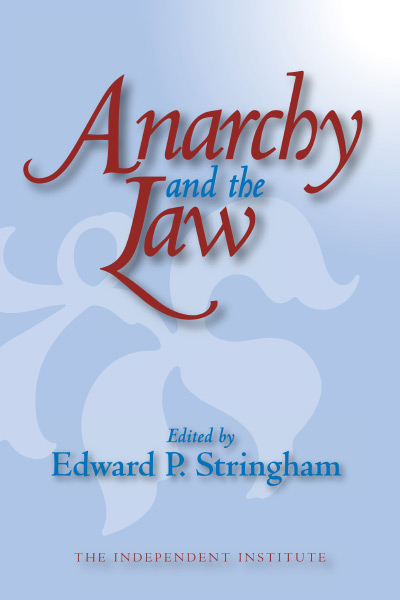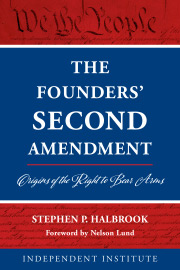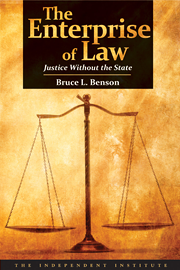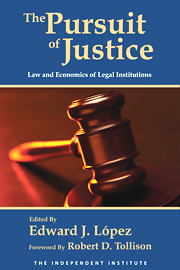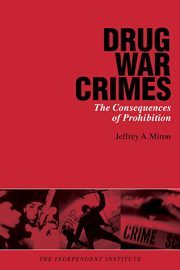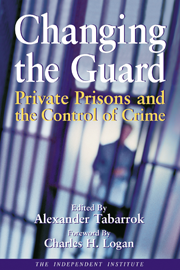| List Price: | ||
| Price: | $19.98 | |
| Discount: | $19.97 (Save 50%) |
| List Price: | ||
| Price: | $19.98 | |
| Discount: | $19.97 (Save 50%) |
Overview
Anarchy and the Law assembles for the first time in one volume the most important classic and contemporary studies exploring and debating non-state legal and political systems, especially involving the tradition of natural law and private contracts.
Should markets and contracts provide law, and can the rule of law itself be understood as a private institution? Are the state and its police powers benign societal forces, or are they a system of conquest, authoritarianism, occupation, and exploitation?
From the early works of Gustave de Molinari, Edmund Burke, Voltairine de Cleyre, Benjamin Tucker, David Lipscomb, and Lysander Spooner to the contemporary thinking of Murray Rothbard, David Friedman, Anthony De Jasay and Bruce Benson, Anarchy and the Law features the key studies exploring and debating the efficacy of individual choice and markets versus the shortfalls of coercive government power and bureaucracy. In so doing, the book also features debates involving Roderick Long’s argument against a nationalized military and Robert Nozick’s critique of stateless legal systems, as well as the work of such scholars as Nobel Laureate economist Douglass North, Tyler Cowen, Robert Ellickson, Randall Holcombe, Randy Barnett, Barry Weingast, Terry Anderson, Andrew Rutten, Jeffrey Rogers Hummel, and others.
Whereas liberals and conservatives argue in favor of political constraints, Anarchy and the Law examines whether to check against abuse, government power must be replaced by a social order of self-government based on contracts.
Contents
-
1. Introduction—Edward P. Stringham
Section I: Theory of Private Property Anarchism
- 2. Police, Law, and the Courts—Murray Rothbard
3. The Machinery of Freedom: Guide to a Radical Capitalism (excerpt)—David Friedman
4. Market for Liberty (excerpt)—Morris and Linda Tannehill
5. Pursuing Justice in a Free Society: Crime Prevention and the Legal Order—Randy Barnett
6. Capitalist Production and the Problem of Public Goods—Hans Hoppe
7. National Defense and the Public-Goods Problem—Jeffrey Rogers Hummel and Don Lavoie
8. Defending a Free Nation—Roderick Long
9. The Myth of the Rule of Law—John Hasnas
Section II: Debate
-
10. The State—Robert Nozick
11. The Invisible Hand Strikes Back—Roy A. Childs
12. Robert Nozick and the Immaculate Conception of the State—Murray Rothbard
13. Objectivism and the State: An Open Letter to Ayn Rand—Roy Childs
14. Do We Ever Really Get Out of Anarchy?—Alfred G. Cuzan
15. Law as a Public Good: The Economics of Anarchy—Tyler Cowen
16. Law as a Private Good: A Response to Tyler Cowen on the Economics of Anarchy—David Friedman
17. Rejoinder to David Friedman on the Economics of Anarchy—Tyler Cowen
18. Networks, Law and the Paradox of Cooperation—Bryan Caplan and Edward Stringham
19. Conflict, Cooperation and Competition in Anarchy—Tyler Cowen and Daniel Sutter
20. Conventions: Some Thoughts on the Economics of Ordered Anarchy—Anthony De Jasay
21. Can Anarchy Save Us from Leviathan?—Andrew Rutten
22. Government: Unnecessary but Inevitable—Randall Holcombe
23. Is Government Inevitable? Comment on Holcombe’s Analysis—Peter Leeson and Edward Stringham
Section III: History of Anarchist Thought
-
24. Gustave de Molinari and the Anti-statist Liberal Tradition (excepts)—David Hart
25. Vindication of Natural Society (excerpt)—Edmund Burke
26. The Production of Security—Gustave de Molinari
27. Individualist Anarchism in the United States: The Origins—Murray Rothbard
28. Anarchism and American Traditions—Voltairine de Cleyre
29. On Civil Government—David Lipscomb
30. No Treason: The Constitution of No Authority (excerpt)—Lysander Spooner
31. Trial by Jury—Lysander Spooner
32. Relation of the State to the Individual—Benjamin Tucker
33. Political and Economic Overview—David Osterfeld
Section IV: Historical Case Studies of Non-Government Law Enforcement
-
34. Are Public Goods Really Common Pools? Considerations of the Evolution of Policing and Highways in England—Bruce Benson
35. Property Rights in Celtic Irish Law—Joseph Peden
36. Private Creation and Enforcement of Law: A Historical Case—David Friedman
37. The Role of Institutions in the Revival of Trade: The Law Merchant, Private Judges, and the Champagne Fairs—Paul Milgrom, Douglass North, and Barry Weingast
38. Legal Evolution in Primitive Societies—Bruce Benson
39. American Experiment in Anarcho-Capitalism: The Not So Wild, Wild West—Terry Anderson and P. J. Hill
40. Order Without Law (excerpt)—Robert Ellickson
Index
Detailed Summary
- “Anarchy” in America? Just as the Pilgrims fled England to create a new society in America, so religious freedom seekers left established towns in colonial New England to create stateless (or quasi-stateless) communities near Albemarle Sound, North Carolina; Portsmouth, Rhode Island; and Warwick, Massachusetts. When one such founder, Rev. Roger Williams, abandoned liberty and became dictatorial, he inadvertently launched a Baptist anarchist movement that denounced his taxes and military draft. Its slogan: “No lords, No masters.” (ch. 27)
- The not so wild, wild West: Although the early American West is often perceived as chaotic, with little respect for property or life, this was not the case. From 1870 to 1885 five of the major cattle towns had only 45 recorded homicides—an average of 1.5 per cattle-trading season. Property rights were protected and civil order prevailed because the market and private contracts provided effective protection and arbitration agencies, either as a replacement for formal government or as a supplement to it. (ch. 39)
- What kind of justice do private courts deliver? Historically, systems of private law creation and enforcement have viewed lawbreaking as an offense against the injured party, not society at large, and justice was primarily about restitution, not retribution. (ch. 34–36, 38) In medieval Iceland, a victim (or his survivors) could sell his right to collect compensation, which made it economically feasible for even the poor to prosecute a case or enforce a verdict. (ch. 36)
- Commercial law before the rise of the nation-state: Merchants of medieval Europe evolved a low-cost institution to adjudicate disputes and enforce contracts with the threat of boycotts. Known as the Law Merchant, it facilitated long-distance trade by solving several problems: it induced traders to behave honestly, to boycott those who had behaved dishonestly, to keep informed about who had been dishonest, to provide evidence against those who had cheated, and to honor the decisions of private judges. (ch. 37)
Is the coercive State necessary? Private-property “anarchism” is a political philosophy of non-state legal systems (self government based on private contracts and natural law) and a set of economic arguments that says that just as markets and private contracts provide bread, so too should they provide law, security, and other services commonly viewed as the province of the State. Security would be provided privately as it is at colleges, shopping malls, hotels, and housing complexes, and courts would be provided privately, as they are with arbitration and mediation today.
Although non-state legal systems are discussed in prestigious academic journals, the classic texts on the subject are scattered about in several books and hard-to-find journals, making it dificult to study this provocative idea in much scholarly detail. Anarchy and the Law: The Political Economy of Choice, edited by Edward P. Stringham, remedies this deficiency by assembling many of the major studies that explain and debate the theory and practice of law and order under a rule of law without a State.
The Theory of Society Without a State
How would society function without a State to provide courts and police? The book’s first section shows how some seminal texts of the modern era have addressed the question. Chapter 2, drawn from Murray Rothbard’s For a New Liberty (1973), argues that disputes would be settled by competing protection agencies, whose customers would hold them accountable to respect individual rights. Chapter 3, drawn from David Friedman’s The Machinery of Freedom, 2nd ed. (1989), argues that under a market for law, people would be free to choose any rules they wish, and the resulting outcomes would be determined by net willingness to pay; although multiple police agencies might operate in different areas, each would have incentives to settle disputes through bargaining rather than violence. Chapter 4, which excerpts Morris and Linda Tannehill’s The Market for Liberty (1972), also argues that multiple defense agencies could produce order in the same geographic area, but it depicts this scenario in a more visionary style.
How would security be handled under a non-state legal system? In chapter 5, Randy Barnett explains that private ownership of the streets would help reduce street crime. He also shows how competing police agencies might deal with unfair renegade enforcers of the law. In chapter 6, Hans-Hermann Hoppe refutes the technical argument that police and courts are “public goods” that can be provided only collectively. The problem of international conflict and security under private-property anarchy is examined in chapter 7, by Jeffrey Rogers Hummel and Don Lavoie, who discuss the free-rider problem as it relates to national security, and in chapter 8, by Roderick Long. In chapter 9, John Hasnas emphasizes that under non-state legal systems, law would evolve in unpredictable ways, and therefore attempting to create a detailed blueprint of how all major problems would be solved by the market is futile or counterproductive.
Debate
Robert Nozick challenged non-state legal systems in Anarchy, State, and Utopia (1974), excerpted in chapter 10. A dominant protection agency, he argues, would be justified in excluding competitors that posed risks to its customers. Chapters 11 and 12 contain rebuttals by Roy Childs and Murray Rothbard, respectively. Childs argues that in the name of reducing risk, Nozick rationalizes the riskiest agency of all: monopoly government. Rothbard argues that Nozick fails to morally justify both monopoly government and the over-arching goal of risk reduction.
Ayn Rand argued, in 1964, that competing protection agencies would lapse into lawlessness and gang warfare, and that a just government is needed to ensure that individual rights are protected with objective laws that are properly enforced. In chapter 13, Roy Childs challenges Rand, arguing that although people should abide by objective laws, a government monopoly itself violates objective natural laws and isn’t necessary to create or enforce them. In chapter 14, Alfred Cuzan argues that creating a government monopoly on the use of force merely replaces one form of anarchic relations with another.
Some critics argue that private-property anarchism is futile because government is inevitable. In chapter 15, Tyler Cowen argues that competing courts would devolve into coercive government due to “network effects.” Law enforcement firms would be highly dependent on each other, and the same mechanism that would enable them to settle disputes cooperatively would also enable them to collude, resulting in a de facto monopoly on force that could extract taxes just like a government. Chapters 16–19 consist of replies by David Friedman, Bryan Caplan, Edward Stringham, and rejoinders by Cowen and Daniel Sutter.
Anthony de Jasay argues in chapter 20 that although many social conflicts would still exist in a stateless society, individuals would have incentives to internalize some of the negative externalities that would result from conflict. Also, repeated dealings with others would create incentives for one to establish a reputation as cooperative. Andrew Rutten replies to de Jasay in chapter 21, arguing that anarchists, like governments, also have incentives to abuse power and expropriate property.
Randall Holcombe, in chapter 22, argues that stateless societies would either devolve into a system of government or be overtaken by force, and thus we should grudgingly accept the State and think of ways to limit its power. In chapter 23, Peter Leeson and Edward Stringham argue that if Holcombe’s assumptions are correct, nothing can be done to limit the growth of government power; and if a truly limited government is possible, as Holcombe suggests, then so too is an orderly and sustainable non-state legal system.
History of Stateless Legal Thought
Private-property “anarchism” has its origins in classical liberalism, which stressed the importance of private-property rights and the need to constrain the state, explains David Hart in chapter 24. Conservative icon Edmund Burke presaged future non-state thought in an anonymous letter, published in 1757, denouncing government in all its forms (chapter 25). But “private-property anarchism” (legal systems without the state) wasn’t articulated fully until the Belgian economist Gustave de Molinari wrote “The Production of Security” in 1847 (chapter 26).
In chapter 27, Murray Rothbard discusses colonial-era anti-statists, such as Anne Hutchinson, who founded voluntary communities in New England, and the Quakers that protested William Penn’s attempt to impose taxes. Individualist anarchist writings from 19th-century America are represented in chapters 28–32. Freethinker and feminist Voltairine de Cleyre argues that individualist anarchists had much in common with the American revolutionaries. Tennessee Christian clergyman David Lipscomb argues that government is founded upon force and therefore should be boycotted. Lawyer and political theorist Lysander Spooner argues that the U.S. Constitution can have no authority over those who were not alive to sign it—and that juries should be allowed to decide whether a law is legitimate. And publisher Benjamin Tucker argues that people will be better off cooperating without government and that if one opposes the initiation of force, one must oppose the state in all its forms. David Osterfeld helpfully delineates the many varieties of anarchism and anti-statism in chapter 33.
Historical Case Studies
How have systems of non-governmental law enforcement actually functioned? In medieval England, where private parties solved disputes, punishment usually took the form of restitution for the injured party, explains Bruce Benson in chapter 34. By the time of the Norman Conquest, however, the king had declared that all restitution payments must go to the crown—which eliminated the incentive for private law enforcement and created the “need” for public law enforcement. In medieval Ireland, private juries settled disputes, and restitution rather than retribution was sought, explains Joseph Peden in chapter 35. In chapter 36, David Friedman describes medieval Iceland’s system of competing law enforcement, which lasted 300 years. People could choose which law-enforcement bodies to join and could switch at will, victims could transfer their right of compensation to a party more likely to collect the fine, and the system’s incentives worked to reduce conflict.
Europe’s medieval merchants often relied on private courts—the Law Merchant—to settle disputes because civil law couldn’t keep up with their growing needs. Merchants who refused to abide by those courts were blacklisted. In chapter 37, Paul Milgrom, Douglass North, and Barry Weingast present a formal game-theory model to show how that system’s incentives fostered cooperation.
Voluntary, non-government law enforcement can also be found in primitive societies. In chapter 38, Bruce Benson describes the voluntary customary legal system of the Kapauku Papuans of West New Guinea. It too is based on reciprocity, reputation, restitution, and a respect for individual property rights.
Terry Anderson and P. J. Hill describe non-governmental dispute resolution on the frontier of the American West in chapter 39. Land clubs helped establish property rights, cattlemen’s associations helped enforce them on the open range, mining camps settled mining claims, and wagon trains dealt with enforcement issues once people traveled beyond federal jurisdiction. In chapter 40, Robert Ellickson describes property-rights enforcement between ranchers and farmers in contemporary Shasta County, California. Rather than follow what the law stipulates, they rely on notions of what they consider right, which often differs significantly from the law.
Praise
“Finally, a fit rejoinder to people who begin sentences with ‘There ought to be a law . . .’”
—P. J. O’Rourke, author, Parliament of Whores and On the Wealth of Nations
“Anarchy and the Law is an important and very powerful book, and for the open-minded, will do a great deal to persuade them that non-state political systems based on voluntary association and private contracts deserve to be taken very seriously indeed.”
—Jan Narveson, Professor of Philosophy, University of Waterloo, Canada
“As the marvelous book Anarchy and the Law demonstrates, a rich intellectual tradition on the desirability and workings of private-property, non-state legal systems stretches back to the mid-nineteenth century. Henceforth, ignorance will be no excuse.”
—Robert Higgs, author, Crisis and Leviathan, Against Leviathan and Depression, War and Cold War
“Scholars interested in scrutinizing the links between political and legal institutions will find Anarchy and the Law an invaluable resource.”
—Tom W. Bell, Professor of Law, Chapman University
“The dynamics of government growth has proven that no matter how benign the original intent and no matter how limited their scope, government programs will eventuate in abuse and malignancy. Anarchy and the Law assembles in one superb volume key essays that embrace this view and in doing so has done us all a great service.”
—Ronald Hamowy, Professor Emeritus of History, University of Alberta, Canada
“With meticulous scholarship, Edward Stringham offers a splendid collection. Anarchy and the Law is a skillful blend of the philosophy, political theory, history, and economics which constitute the framework of one of the least understood political traditions. The book is quite simply a tour-de-force.”
—Wendy McElroy, editor, Liberty for Women
“Anarchy and the Law is a breakthrough work, one which anyone interested in politics will find intellectually exciting.”
—Ralph Raico, Professor of History, Buffalo State College
“Anarchy and the Law should become the beginning for any serious examination of our most deeply held beliefs about government—a ‘must read’ for anyone open to ideas and interested in the preservation of liberty.”
—Thomas J. Nechyba, Professor of Economics, Duke University
“Anarchy and the Law assembles the very best research—theoretical and empirical—on markets' surprisingly robust capacity to supply law and other public goods.”
—Donald J. Boudreaux, Professor of Economics, George Mason University
“Edward Stringham has assembled an excellent—and much-needed—book. Anarchy and the Law is a welcome addition to the scholarship, teaching, and investigation of politics.”
—James R. Otteson, Professor of Philosophy, University of Alabama
“Much work in political philosophy is conducted on the basis of an uncritically-held assumption that only the state can supply law and public order. Anarchy and the State should shake such writers from their dogmatic slumbers. This book is a must for any college or university library, and I'd strongly recommend it as a gift for any intelligent young (or old!) person whose ideas could do with a shake-up.”
—Jeremy Shearmur, Reader in Philosophy, Australian National University
“Anarchy and the Law is an essential book on the theory and history of 'non-state' legal systems in which law enforcement is privatized, including essays by both proponents and skeptics.”
—Lawrence H. White, Friedrich A. Hayek Professor of Economic History, University of Missouri, St. Louis
“Recent scholarship in political economy exhibits renewed interest in the possibility of stateless order. What was formerly a topic reserved primarily for ‘normative’ political economists interested in defending the free society is now a one dealt with by purely ‘positive’ political economists as well. . . . [In Anarchy and the Law,] Stringham has performed an invaluable service both in advancing the case for private property anarchy, and for making this case accessible to a wider audience.”
—Public Choice
“There is no mistaking the contents from the title of the book. Anarchy and the Law: The Political Economy of Choice collects, by all accounts for the first time on this scale, fundamental writings on non-state legal and political systems. . . . Specialists, certainly, will find it extremely valuable, although they will be familiar with the bulk of its content. It is probably most useful, then, to those with a passing interest in the subject; those who would like to read up on it but do not intend to devote much time to a search for relevant work. Ultimately, however, to find this book interesting (and useful), all one truly needs is an open mind and a willingness to contemplate well constructed arguments. . . . essential and enormously valuable. . . . The material included in the book is chosen with an even hand, thereby making the volume all the more valuable for the non-specialist.”
—Journal of Economic Issues
"The illusion of security is the crux of the rationale of statism. Anarchism has the burden of convincing people that stateless law and order are not just possible, but superior, due to the state's proclivity towards legal excess. Anarchy and the Law is a landmark book in bringing together the various strands of non-state legal thought, including works that are already of historic importance. The advocate of self-government who seeks to convince others of the non-necessity of states can now say: go and read this book! The pro-state reader will also benefit from the challenge posed by stateless thought at its best."
—Fred E. Foldvary, Director, Civil Society Institute, Santa Clara University
"There is little to fear from the strong criticism but much to fear from the weak defense. Anarchy and the Law is an excellent book providing a strong defense for market-provided law. The verdict is in, and proponents of state legal systems have much work to do defending their position."
—Peter T. Leeson, Professor of Law and Economics, George Mason University
Author
Edward P. Stringham is a Research Fellow at The Independent Institute, the Lloyd V. Hackley Endowed Chair for Capitalism and Free Enterprise Studies at Fayetteville State University, and past President of the Association of Private Enterprise Education.
News
| “The State as a Business and Incentive Structure” Anarchy and the Law edited by Research Fellow Edward Stringham cited on ActivistPost.com | Fri., Jul. 12, 2019 |

